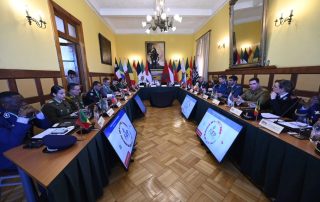As part of the FIEP, a delegation from the French Gendarmerie Nationale travelled to Chile in mid-December 2024 to lead the first commission of its term of office as President. This commission focused on the human resources aspect of the theme chosen by France: ‘Impact and challenges of artificial intelligence’.
On 23 October 2024, in Rome, the French national gendarmerie took over the presidency of FIEP, the association of the world’s gendarmeries, succeeding the Italian Carabinieri for a one-year term.
To kick off this new year and this new cycle of reflection, France has chosen ‘the impact and challenges of artificial intelligence’ as its theme. Four commissions will be set up throughout the year, in line with the FIEP’s structure, to foster discussion and advance the debate around this theme. They will focus on the themes of human resources, international affairs, new technologies and service organisation.
It was against this backdrop that the first commission was held in Chile from 10 to 13 December. Led by France and organised by Chile, the host country, the commission focused on the issue of artificial intelligence in human resources, and brought together gendarmes from fifteen of the FIEP’s 21 member countries.
As president for 2025, the French gendarmerie was represented by a delegation comprising a representative of the Director General of the Gendarmerie Nationale, General Stéphane Lacroix, head of the Pôle des affaires européennes et internationales (PAEI), the two national contact points, Squadron Leader Olivier Monceret, from the Gendarmerie Command for External Missions (CGMEX), in charge of the FIEP, and his deputy, Major Maurice Lehmann, as well as experts in the persons of General Patrick Perrot, expert coordinator in charge of I. A. issues in the Gendarmerie. A. issues in the gendarmerie, and Lieutenant-Colonel Cédric Calmettes, from the National Gendarmerie Human Resources Department (DRHGN).
At the meeting, the various military police forces discussed the wide range of possibilities offered by the AI, particularly in terms of human resources. It is part of the day-to-day work of internal security forces, saving considerable time on low value-added tasks and putting managers back at the heart of their human resources work.
‘ A number of countries are already using A.I., with chatbots and other tools that give managed staff access to all the information they need. The recruitment and selection chain also benefits greatly from the opportunities offered by A.I.: the mass processing of candidate files saves time and increases efficiency, and the selection of specific profiles is made easier. Predictive and generative tools are also made available to managers, in particular to support the field of occupational health, as the physical and psychological health of staff is a major concern for managers. Finally, the use of A.I. in the construction of an ambitious HR policy is taking shape in the short and medium term ’, sums up one of the French participants in the commission.
After mentioning the positive aspects of artificial intelligence, the vigilance points linked to its use were addressed. These included problems of bias, data protection and user training. These are topics that will be developed throughout the year.
The next commission, to be held in the Netherlands from 7 to 10 April 2025, will focus on international affairs. In particular, it will look at the legal frameworks for A.I. use in different countries. The aim is to ensure that the law evolves to accommodate different uses.









